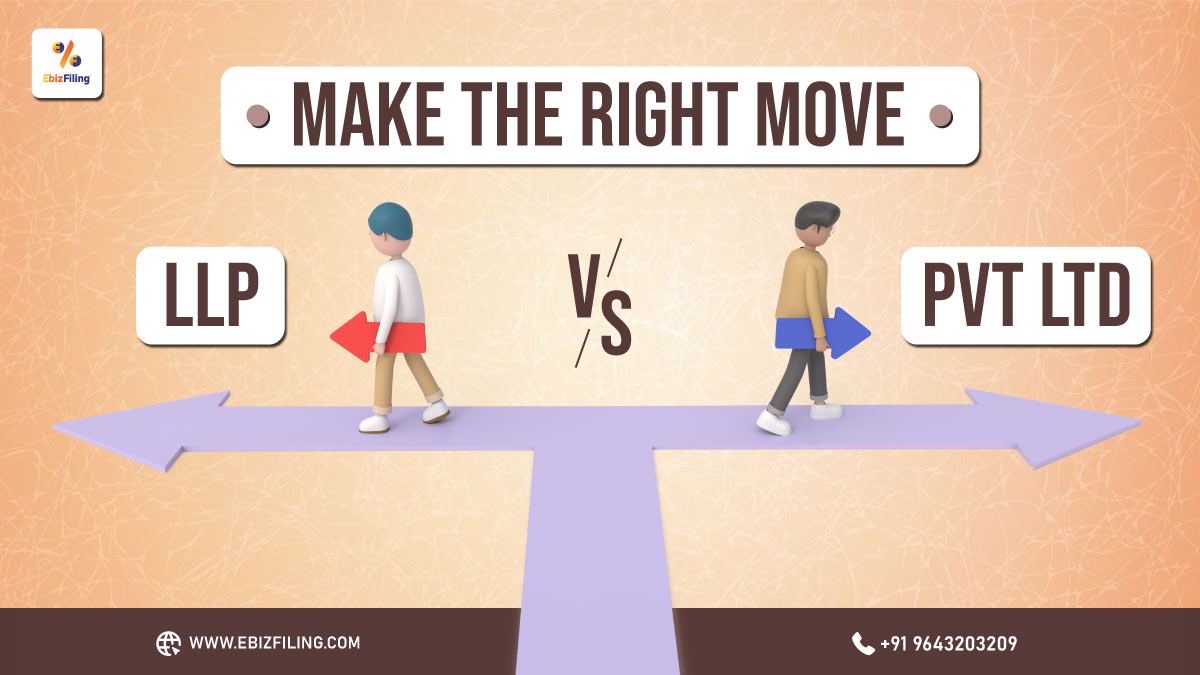Difference Between LLP and Pvt Ltd Company
The table below gives you a clear overview of how an LLP differs from a Private Limited Company.
|
Point of Difference |
LLP (Limited Liability Partnership) | Private Limited Company |
| Meaning | A flexible business structure that combines features of a partnership and a company. | A separate legal entity that is owned by private shareholders. |
| Members | Requires at least 2 designated partners with no limit on the maximum number of partners | Requires at least 2 directors and 2 shareholders and can have up to 200 shareholders. |
| Compliance Burden | Comparatively less compliance and easier maintenance. | Higher compliance with regular filings and audits. |
| Annual Audit | Mandatory only if turnover exceeds ₹40 lakh or contribution exceeds ₹25 lakh. | Mandatory, regardless of turnover. |
| Fundraising | Difficult to raise funds from investors or VCs. | Easier to raise funds; preferred by investors and financial institutions. |
| Ownership Transfer | Transferring ownership is complex and may need partner consent. | Easy transferability through shareholding. |
| Credibility | Considered less credible than companies by investors and clients. | Higher credibility in the market, especially with banks and investors. |
| Conversion Option | Can be converted to a private limited company if needed. | Can also convert to a public limited company for expansion. |
| Best Suited For | Professionals, service-based firms, and small businesses. | Start-ups with growth plans, funding needs, and larger operations. |
Advantages of LLP and Pvt Ltd Company
LLP
- The personal assets of partners are safeguarded from business debts and liabilities.
- LLPs have fewer legal and regulatory obligations than Private Limited Companies.
- There is no mandatory capital requirement for starting an LLP.
- Partners have the flexibility to define the operational structure and management through an LLP agreement.
- LLPs are not subject to dividend distribution tax; they are taxed only at the LLP level.
- LLPs are ideal for service-oriented or professional businesses that do not need external funding.
Private Limited Company
- Shareholders’ personal assets are safeguarded from the company’s liabilities.
- A Private Limited Company is a separate legal entity, independent from its owners.
- Private Limited Companies have the ability to secure investments easily, venture capital, and bank loans.
- The company remains in existence even if there are changes in ownership or management.
- It is well-suited for businesses aiming for growth, expansion, or large-scale operations.
- A Private Limited Company enjoys greater trust and credibility among customers, suppliers, and investors.
Disadvantages of LLP and Pvt Ltd Company
LLP
- LLPs are not well suited for large businesses with complex operations or those looking for substantial external investment.
- Raising venture capital or securing funds from investors is more challenging for LLPs compared to Private Limited Companies.
- The structure of an LLP may restrict its ability to scale quickly or expand as efficiently as a Private Limited Company.
- Investors, banks, and larger organizations often perceive LLPs as less credible.
- In an LLP, all partners must actively participate in decision-making and management, which reduces flexibility for passive investors.
Private Limited Company
- Private Limited Companies face more stringent regulatory and compliance requirements, including mandatory audits, annual filings, and extensive documentation.
- Establishing a Private Limited Company is costlier than forming an LLP, due to higher registration fees, legal paperwork, and other formalities.
- The financial information and shareholder details of the company are publicly accessible, which can compromise privacy.
- Private Limited Companies are liable for dividend distribution tax, potentially increasing the tax burden on shareholders.
- Although transferring ownership is simpler than in an LLP, it still requires formal documentation and approval in a Private Limited Company.
Conclusion
Choosing between an LLP and Pvt ltd Company depends on your business model, funding needs, and growth plans. LLPs are suitable for small, service-based startups looking for low compliance and flexibility. On the other hand, Private Limited Companies offer better scalability, credibility, and access to investments; making them ideal for growth focused startups. Carefully assess your goals before selecting the right business structure for your startup.
Suggested Read :
LLP Annual Filing for Startups
Startup Tax Exemption in India
Company Name Availability for Startups











February 17, 2026 By Steffy A
Understanding the Four Types of Legal Risk: An Indian Perspective Introduction At EbizFiling, one complaint we often get from Indian entrepreneurs and directors is: “Our business is performing well, but with the changing regulations, it is difficult to […]
January 1, 2026 By Dhruvi D
How Indian LLPs Can Work With Their Own US LLC: A Compliance Guide Introduction We recently handled a real case where founders were operating an Indian LLP alongside their own US LLC and faced multiple questions related to GST, foreign […]
December 24, 2025 By Dhruvi D
Private Limited Company Incorporation in India with Ebizfiling Introduction At Ebizfiling, we simplify the process of Private Limited Company incorporation in India for aspiring entrepreneurs and small business owners. When you’re starting a new venture, our team ensures your registration […]